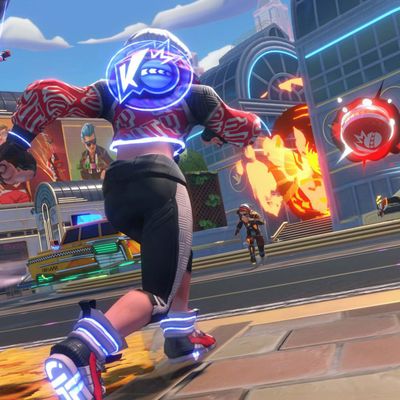
In Knockout City, your teammates can tuck their head into their knees until they resemble a dodgeball. An ally can pick them up and chuck them at the nearest adversary — make contact, and it’s an automatic KO … unless the opposing squad happens to intercept the toss. In that scenario, they can jettison your poor, helpless human turned ball off the nearest ledge and into the sunset. This technique is core to the Knockout City experience. Anyone who wants to get good at the game needs to master the art of catch and release. It’s also one of the funniest mechanics I’ve ever seen implemented in a video game — your friend screaming in terror as they blink out into the middle distance like Wile E. Coyote. Knockout City is one of the surprise hits of the summer because of choices like these. No game does a better job at maintaining its strategic chops, while still indulging our silliest multiplayer fantasies.
Electronic Arts is a publisher that specializes in steely military shooters like Battlefield and annualizable sports sims like Madden, F1, and FIFA. Knockout City, a three-on-three arena-dodgeball game, is a distinct outlier in the catalogue. The company recruited Velan Studios (the upstart team behind mixed-reality Mario Kart game Home Circuit) for the task. Together, they benched torrid conflict zones and true-to-life stadiums in favor of a futuristic, Day-Glo utopia populated entirely by cocksure teenage punks who’ve transformed the world’s foremost middle-school pastime into a legitimate blood sport. The overarching premise is simple: Two teams race to ten eliminations using basic dodgeball rules — find a ball, throw it at an opponent, hope they don’t catch it. But at every turn, Velan has amplified Knockout City’s premise to ludicrous, hysterical degrees.
Here are just a few examples. There’s a map called “Jukebox Junction” set on a neon subway station where trains are constantly zooming by. With a well-timed toss, you can bounce an opponent into oncoming traffic, Matrix-style. Occasionally, players will encounter special dodgeballs called “moon balls,” which allow them to float to sickening heights before raining down hellfire from above. If you snatch a projectile right before it connects with your face, you can toss it back at your assailant at a higher velocity. This can continue — ping-ponging between competitors — until the ball is moving at light speed. With so many other multiplayer ventures on the Steam charts, as studios around the country beckon us toward yet another grim deployment into a war-torn Eastern European hamlet, EA has broken the code by purging firearms from the staid team death-match equation. Clearly, it resonated. Earlier this month, Valen Studios announced that Knockout City has already eclipsed 5 million players, as a global community becomes reacquainted with the glory they last felt during a distant, forgotten recess.
You’d be forgiven if all of this sounds like a slightly more comprehensive Mario Party mini-game. After all, one of Knockout City’s core appeals is its simplicity; anyone can get the basics down, even if they’re five beers deep. But like Rocket League before it, the more you sink your teeth into Valen’s creation, the more you’ll discover the nuances, feints, and shrewdness built into what initially appears as a featherweight dodgeball game. After a handful of hours online, the matchmaking apparatus will start to pit you against teams that are bringing strategies more intelligent than whipping balls out at the fastest possible pace. That’s when you first see how Knockout City gives everyone the tools to truly break an opponent down. Maybe you pump-fake a few times, baiting out the enemy’s counter, before blasting them into oblivion while they’re hopelessly vulnerable in a botched blocking animation? Maybe you chuck your ball at the lowest possible speed — like a changeup from the pitcher’s mound — using the villain’s twitchiness against them to score an easy point? Maybe you stake out the high ground, blocking the other team’s sight lines, so they’ll have no idea what angle you’re aiming from? These subtleties are indelible, and they encourage you to keep digging deeper.
That design acumen is why I think Knockout City has staying power, and also why I hope the game is eventually blessed with its very own competitive scene. We’re seeing shades of it already. A couple of independent e-sports leagues have already popped up, though both EA and Valen have thus far remained noncommittal about funding a professional Knockout City federation. Part of the appeal of e-sports is to watch gamers excel within ridiculous parameters — like the world’s best mascot brawler, or the world’s best car-soccer pilot. The world’s best cybernetic dodgeball player would be a fantastic entry to the canon. The community has barely scratched the surface of what’s possible in Knockout City, so I’d love to see what happens if the true auteurs of this game are incentivized to cook — smiting one another off the map with devilish spin and horrifying acceleration, pushing the very definition of dodgeball to its hallucinogenic extremes.
But you don’t have to care about any of that stuff! Go ahead and play Knockout City as a total casual. Ignore all of those nuances entirely, and never for a moment worry about getting better. That’s the real beauty here; Knockout City is a video game that rewards play both exceedingly smart and exceptionally dumb, and the developers seem to recognize that their continued success relies on everyone in the community feeling like they have a home. You can dive into the weeds and determine the perfect frame to fire off a half-charged lob shot from the left flank, or you can get drunk with your buddies and toss them off the map until they rage-quit. Those are the demographics that make up the 5 million players of Knockout City — the party game that’s only as serious as you want it to be.

